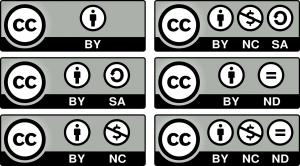Why Adapt an Open Textbook
3 Permission to Adapt
When it comes to working with open textbooks (and open educational resources in general), one of the conceptual hurdles faced by most people is around the notion of adapting or changing someone’s work. What exactly can be adapted within the scope of an open textbook, and won’t the original author get upset if you change their work?
Changing someone’s work can feel uncomfortable. But rest assured, if the author has released their textbook under a Creative Commons licence that allows for adaptation (which is any Creative Commons licence that does not have a No Derivative (ND) attribute added to it) then they expect that you will change the content, providing you give them the proper attribution (and we’ll get into this). Using information and media from an open textbook or other open educational resource are NOT considered plagiarism.
But what can you change?
Anything and everything in an open textbook can be changed as long as the conditions of the open licence are met. The modifications or changes you make can be fairly minor or major depending on what you need to do to make the book work for you. That is the beauty and power of open textbooks. You are in charge of the resource. You have been given permission to change it ahead of time by the original author. Take advantage of it. They want you to.
Why you should use openly licensed materials
If you are looking for content to add to your textbook, you should look for and use Creative Commons licensed material (learn more in this appendix about Licences and Tools in the Self-Publishing Guide). While you can use material that has not been released under a Creative Commons licence, it does limit how others can use or reuse that material. As well, you must first obtain written permission from the copyright holder to use copyrighted material in the textbook and clearly note in the textbook the specific material that is copyrighted. This is to ensure others using the book in the future know they cannot reuse that material.
Don’t forget the public domain
Once the copyright of a work has expired, has been forfeited, or is inapplicable, it is part of the public domain, meaning that permission is not required to use it or make changes to it. Creative Commons provides public domain tools that enable authors and copyright owners who want to dedicate their works to the worldwide public domain to do so, and facilitates the labeling and discovery of works that are already free of known copyright restrictions.
Note:
Using copyright material released with a restrictive licence is a barrier to future reuse and limits the usage of the resource in the future. Therefore, we recommend using Creative Commons licensed material that can legally be shared and reused.

See Choose a Licence.

